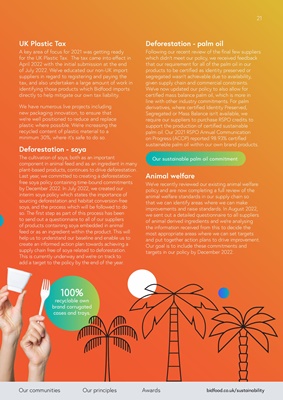
21
bidfood.co.uk/sustainability
Our principles
Our communities Awards
UK Plastic Tax
A key area of focus for 2021 was getting ready
for the UK Plastic Tax. The tax came into effect in
April 2022 with the initial submission at the end
of July 2022. We've educated our non-UK import
suppliers in regard to registering and paying the
tax, and also undertaken a large amount of work in
identifying those products which Bidfood imports
directly to help mitigate our own tax liability.
We have numerous live projects including
new packaging innovation, to ensure that
we're well positioned to reduce and replace
plastic where possible. We're increasing the
recycled content of plastic material to a
minimum 30%, where it's safe to do so.
Deforestation - soya
The cultivation of soya, both as an important
component in animal feed and as an ingredient
in many plant-based products, continues to drive
deforestation. Last year, we committed to creating
a deforestation-free soya policy containing timebound commitments by December 2022. In July
2022, we created our interim soya policy which
states the importance of sourcing deforestation
and habitat conversion-free soya, and the process
which will be followed to do so. The first step
as part of this process has been to send out a
questionnaire to all of our suppliers of products
containing soya embedded in animal feed or as an
ingredient within the product. This will help us to
understand our baseline and enable us to create
an informed action plan towards achieving a supply
chain free of soya related to deforestation. This
is currently underway and we're on track to add
a target to the policy by the end of the year.
Deforestation - palm oil
Following our recent review of the final few suppliers
which didn't meet our policy, we received feedback
that our requirement for all of the palm oil in our
products to be certified as identity preserved or
segregated wasn't achievable due to availability,
given supply chain and commercial constraints.
We've now updated our policy to also allow for
certified mass balance palm oil, which is more in
line with other industry commitments. For palm
derivatives, where certified Identity Preserved,
Segregated or Mass Balance isn't available, we
require our suppliers to purchase RSPO credits to
support the production of certified sustainable
palm oil. Our 2021 RSPO Annual Communication
on Progress (ACOP) reported 98.93% certified
sustainable palm oil within our own brand products.
Our sustainable palm oil commitment
Animal welfare
We've recently reviewed our existing animal welfare
policy and are now completing a full review of the
animal welfare standards in our supply chain so
that we can identify areas where we can make
improvements and raise standards. In August 2022,
we sent out a detailed questionnaire to all suppliers
of animal derived ingredients and we're analysing
the information received from this to decide the
most appropriate areas where we can set targets
and put together action plans to drive improvement.
Our goal is to include these commitments and
targets in our policy by December 2022.
100%
recyclable own
brand corrugated
cases and trays.